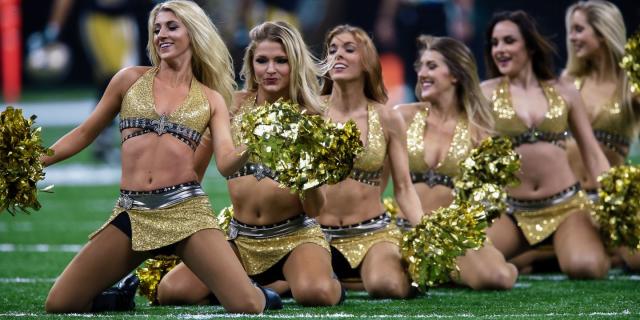Bailey Davis, 22, recently filed a complaint with the Equal Employment Opportunity Commission claiming she was fired from the New Orleans Saintsations for posting an Instagram of herself wearing a one-piece bathing suit. However, the former professional cheerleader’s mistreatment is just one example of mistreatment in the industry. In fact, several current and former cheerleaders recently told The New York Times that they’re routinely subjected to harassment and groping by fans.
“When you have on a push-up bra and a fringed skirt, it can sometimes, unfortunately, feel like it comes with the territory,” said Labriah Lee Holt, a former cheerleader for the Tennessee Titans. “I never experienced anything where someone on the professional staff or the team said something or made me feel that way. But you definitely experience that when you encounter people who have been drinking beer.”
Team officials know that the harassment happens, but don’t do much to prevent it, cheerleaders told the paper, pointing out that they’re regularly required to mingle with fans at games and promotional events where people are often consuming alcohol. One Redskins cheerleader who remained anonymous also said that she and several of her teammates once had to go to a fan’s house, where men were drinking, and watching a football game.

A cheerleader for the Dallas Cowboys who was also anonymous said a fan for an opposing team once caught her eye and said, “I hope you get raped!” “That’s the kind of stuff we’d have yelled at us. Even from our fans, once they get drunk, they yell things, and you’re like, ‘Really?’ It’s part of the job. It comes with it. You’re supposed to take it,” she said.
The Cowboys cheerleader says that the cheerleading squad is taught how to navigate groping fans, with comments like “That’s not very nice” or “Can I ask you to step over here?” “Use body language to help deter the situation,” she said. “Never be mean. Never. Always courteous. Because if it’s not for the fans, we wouldn’t be here — that’s how we were supposed to think of this.” And cheerleaders are well aware that if they did object to a fan’s groping or harassment, they’d be dismissed from the team, she says.
Cheerleaders aren’t the only workers who are subjected to this kind of behavior: Restaurant servers, models, and flight attendants are routinely encouraged to grin and bear sexual harassment when it occurs. (A shocking two-thirds of female servers reported to the Restaurant Opportunities Center that they have endured sexual harassment from their employers, customers, and fellow staffers, and half said they actually feared for their safety at work.)
“Sexual harassment should never be the price of a paycheck in a modern society,” Delia Coleman, director of strategic communications at Equal Rights Advocates, tells Yahoo Lifestyle. “For any worker, especially those in roles that require a lot of contact with customers or clients, unwanted physical touching, leering, or a clearly hostile working environment is never acceptable. It’s concerning but also not surprising that women have been made to feel this way because they are explicitly instructed to tolerate it and threatened with termination if they don’t.” Saying things like “I hope you get raped” also goes beyond harassment and into serious threats, Coleman points out.
It can often feel to employees like they alone are responsible for their own safety on the job, but sexual harassment expert Mike Domitrz, founder of the Date Safe Project, tells Yahoo Lifestyle that it is “absolutely” the responsibility of employers to create a safe environment for their employees. Employers, including sports teams and franchises, can be liable for the sexual harassment their employees experience in the course of performing their work duties, even if the harassment is coming from a non-employer, like a customer or booster, Coleman says.
While basic fundamentals of sexual harassment are largely the same from state to state, every state approaches them slightly differently. That’s why Domitrz recommends that people who are in jobs that regularly subject them to sexual harassment contact a local crisis center to find out specifics on their rights.
Everyone has the same rights under federal and state law, Coleman says, including the right to file a sexual harassment claim at the federal level with the Equal Employment Opportunity Commission (EEOC), and if applicable, in their state with the appropriate agency. They also have a right to not be retaliated against, Coleman says. Unfortunately, the timeline for this is fairly short—about 180 days from the time of the harassment—to file a charge with the EEOC before they file a complaint in court.
Some critics may claim that people set themselves up for harassment when they willingly enter into a field where they’re physically exposed or where harassment is a known issue. But there’s one major point people should keep in mind. “It’s never OK,” Domitrz says. “There is nowhere in the law where it says that you’re exempt from harassment. You always have the right to be protected.”

No comments:
Post a Comment